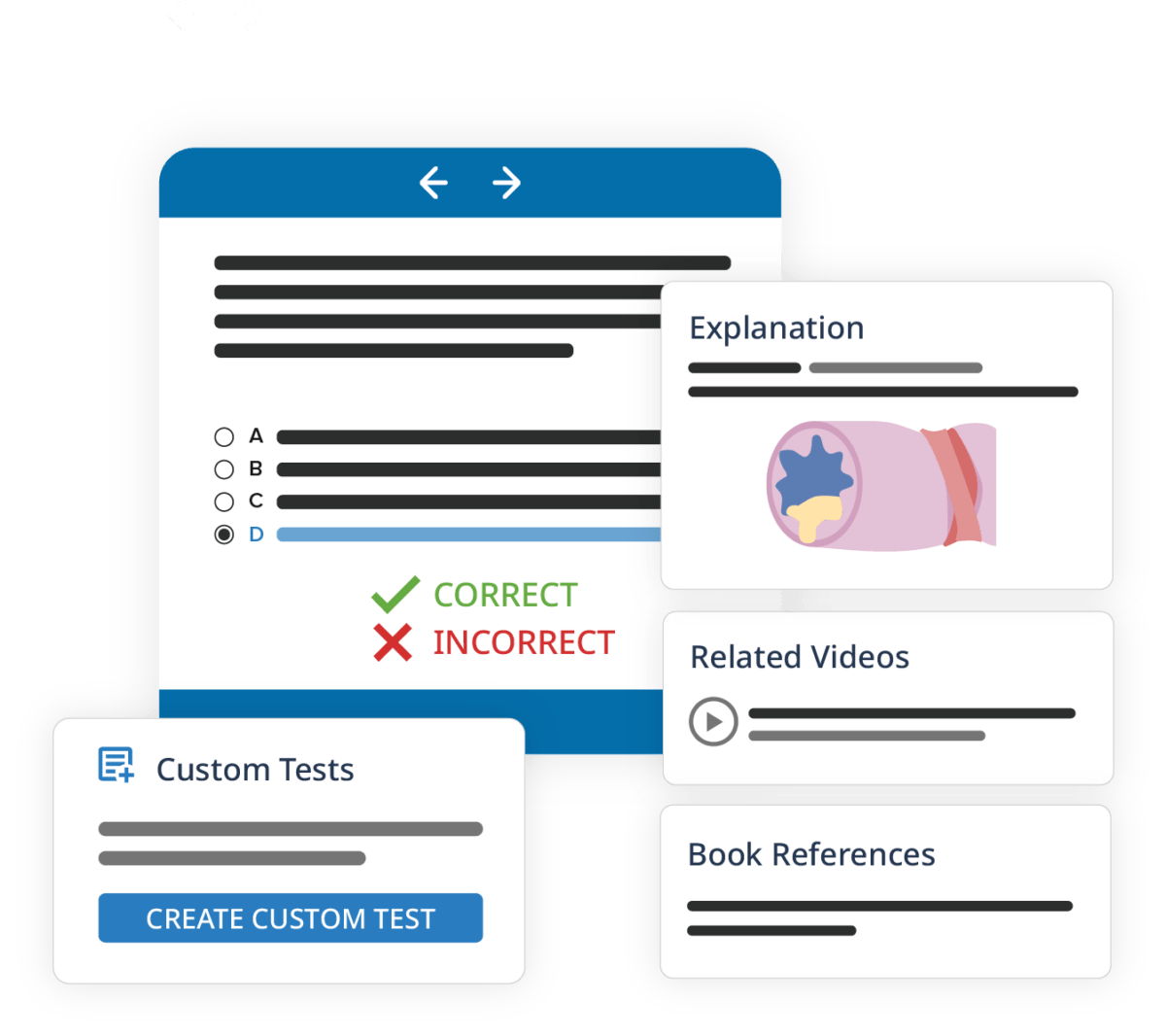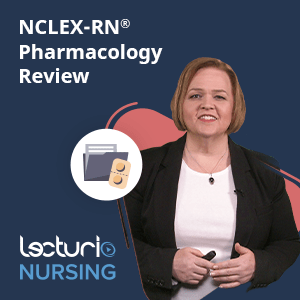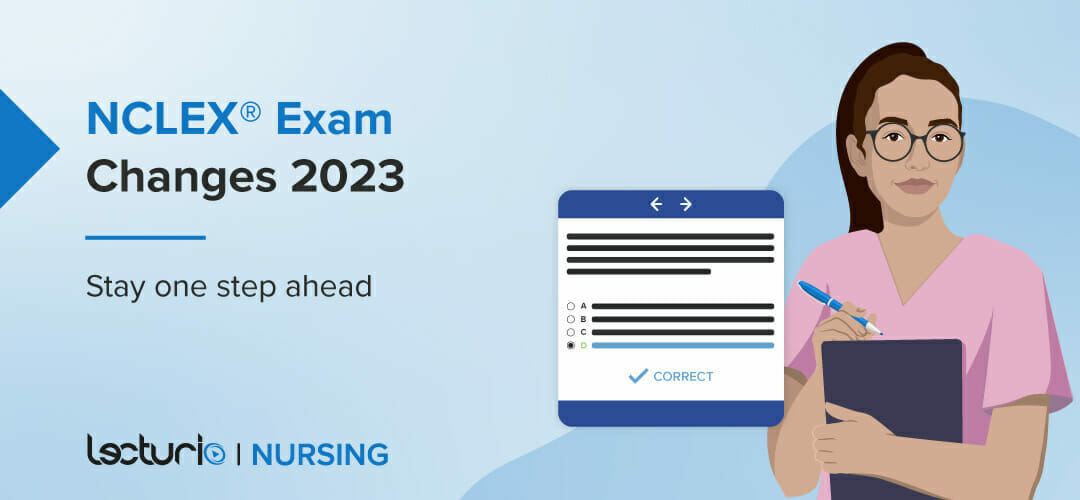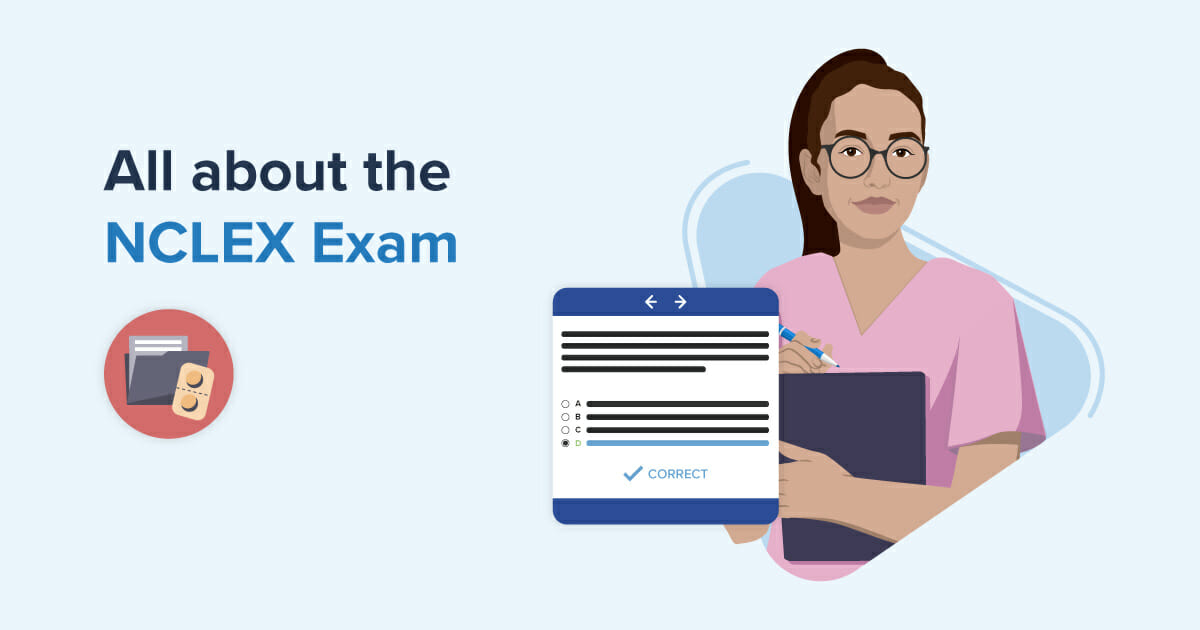If you are close to completing a nursing degree, you are probably already practicing a few questions daily. Plus, nursing lecturers love to include “NCLEX®-style questions” on every quiz. Therefore, the announcement of a new NCLEX® format (large enough to deserve the name “Next Gen NCLEX®”) may have added a bit of anxiety and uncertainty to your study plan.
So what’s this all about? Let’s look at all the available information we have so far.
First Things First: What Is the NCLEX®?
The NCLEX® is also known as “boards” or “board exams”. This is an exam that all nursing candidates must pass after graduating from nursing school to be able to legally practice as a Licensed Practical Nurse (LPN/LVN) or a Registered Nurse (RN).
The exam’s format, the topics covered, and the passing standards are determined by the National Council of State Boards of Nursing (NCSBN®). Depending on the nursing degree you are pursuing, you will have to take one of two versions of the NCLEX®: the NCLEX-PN® or the NCLEX-RN®.
What is the NCLEX® for?
When you’re approaching the senior year of nursing school, it’s easy to think that the sole purpose of the NCLEX® is to cause extra stress.
In reality, the exam is meant to certify that a nurse has all the required competencies (that is, clinical judgment and decision-making skills) needed to practice safety. With each candidate receiving the same type exam format and being given questions from each of the Client Needs Categories, each State Nursing Board can be sure, without question, about its members’ baseline knowledge.
By enrolling in an accredited nursing program, your State Board of Nursing has already looked into your school’s quality standards. They have evaluated the syllabus, clinical hours, simulation hours and faculty/instructor qualifications.
However, it’s possible to complete an accredited nursing program and still be left with some knowledge gaps. Preparing for the exam with a comprehensive study plan is ideal to ensure a successful pass.
How does the exam currently work?
As of 2022, both versions of the NCLEX® comprise anywhere between 75 and 145 items selected from a pre-set question bank, which include 15 pre-test items that are not scored. These items are a combination of up to 6 types that a candidate may see on the exam.
The 6 item types are:
- Multiple choice
- Multiple select all that apply
- Fill in the blank
- Ordered response (drag/drop in order)
- Hot spot
- Chart/exhibit
The exam uses a “computerized adaptive testing” formula that progressively selects more challenging questions as the candidate progresses through the exam.
All test takers begin with equally “easy” questions. Then, for each question answered correctly, the “adaptive” formula will select a slightly harder one from one of the four Client Needs Categories. For a successful pass, you’ll have to reach the hardest tier in 145 questions or fewer. You won’t be able to flag questions, skip them, or change the answers to past ones. The pass or fail decision will NOT be known at the time the computer cuts off (which can be from 75 to 145). The candidate will receive mailed notification in 6 weeks, unless an additional fee is paid to receive the information earlier.
These questions are designed to cover four areas that are essential for client care:
| Safe and effective care environment | This section contains items for protecting the client and health care personnel, managing or triaging care, concepts about PPE and infection control strategies. |
| Health promotion and maintenance | This section contains items about educating clients on disease processes, acting as a client’s advocate, or promoting a healthy lifestyle. |
| Psychosocial integrity | In this section, items will test how to protect a patient’s mental health well-being while delivering care. Cultural practices & beliefs, spiritual factors and stresses are included. |
| Physiological integrity | This section contains items on managing a client’s physiological needs – such as medication and parenteral administration, risk management, acute/chronic conditions and comfort or pain management. |
2023 NCLEX® Changes—What to Expect from this Major Overhaul
The NCLEX® performs a practice analysis every three years to ensure the content distribution matches with what is seen in everyday nursing practice. There is a large pool of items and the NCSBN states these are rotated periodically, and contain so many items that candidates will not see a duplicated question even if the exam is repeated.
From the moment it was announced, the Next Gen NCLEX® (or NGN) has introduced changes within scoring and some new item types. Its purpose is to ensure candidates are able to perform clinical judgment and decision-making as a new nurse.
We know that the NGN will include five new different types of questions. In addition to the current multiple choice questions, you can now expect to see some of these new types:
- Multiple response (Select all that apply, select N, multiple response group)
- Highlight (highlight test, highlight table)
- Drag-and-drop (drag-and-drop cloze, drag-and-drop rationale)
- Drop down (drop down cloze, drop down table, drop down rationale)
- Matrix/grid (matrix/grid multiple response, matrix/grid multiple choice)
Finally, the look of the exam will also change. Rather than presenting a short scenario and question for each item, the exam will contain a minimum of three “case studies”. A case study consists of 6 questions pertaining specifically to that case/scenario. If the candidate continues taking questions after the minimum of 75, the candidate may see up to 7 more of the new item types.
Each of the new type items will be shown on a split-screen, which will show the client information on the left side of the screen and the question on the right side. The case study will imitate real-life medical records, with separate tabs to view (such as health history, lab results, or nursing notes).
In this way, the relevant and irrelevant information will be presented with each question—similar to real life practice.
Why Is the NCLEX® Changing?
Clearly, a lot of work is being put into redoing the NCLEX®. So why is the NCSBN® trying to go beyond their routine reviews?
The need for a new method of assessment clinical judgment was identified in 2017, following a massive nationwide RN Nursing Knowledge Survey. During this survey, it became evident that a nurse’s scope of practice is now much broader. In addition, clients have more acute conditions and caring for them involves more profound knowledge and complex decision-making skills.
The new exam structure and question formats are meant to better “assess the clinical judgment” of all candidates.
Before the Next Gen NCLEX begins in April 2023, a “Special Research Section” has been a volunteer section of the NCLEX for several years, as data is gathered on the new type of questioning. The additional research questions are separate from the NCLEX and are not part of the scoring. This helps to ensure that the new question formats are understandable, appropriately coded, and representative of the latest standard of care.
FAQs on the Next Gen NCLEX®
Still have questions? So do most of us! Here is a quick rundown of the most pressing queries we all have about the Next Gen NCLEX®.

When does the Next Gen NCLEX® start?
The new exams go live on April 1, 2023.
How does the Next Gen NCLEX® score the new types of questions?
The exams will continue using the computerized adaptive testing formula, so the total number of questions will vary from person to person. There will be partial scoring applied per question and type. More information on scoring can be found in this publication.
What will the Next Gen NCLEX® passing grade be?
As in nursing school, there is not an “passing grade”, but the computer will decide on a pass or fail by one of the 3 rules:
- 95% Confidence Interval Rule
- Maximum-Length Exam Rule
- Run-out-of-time (R.O.O.T.) Rule
These rules apply to both the RN and LPN versions of the exams.
Is the new NCLEX® harder?
When it comes to tests, “hard” is very subjective. Because of its emphasis on critical thinking, the NGN will require you to understand disease processes and think like an independent nurse. If you always struggled with memorizing “dry info” but are excellent in case studies, it may be a plus for you!
Still, the new Next Gen NCLEX® format will require you to start studying differently.
Ultimately, the process of becoming a nurse goes beyond exam day. If you stay on top of your studies throughout your career and jump into your clinicals ready to take the initiative, you will maximize your chances of success. If you feel graduation is looming near, then consider this step-by-step review, that provides illustrated explanations by Prof. Rhonda Lawes in her Med Surg Nursing & Pathophysiology course. We are here to help you succeed and achieve your dreams!

Take the Course: Pathophysiology
Learn all you need to know to provide advanced patient care.

NCLEX® Pharmacology Review
This review will prepare you to crush Pharm on the NCLEX®!



